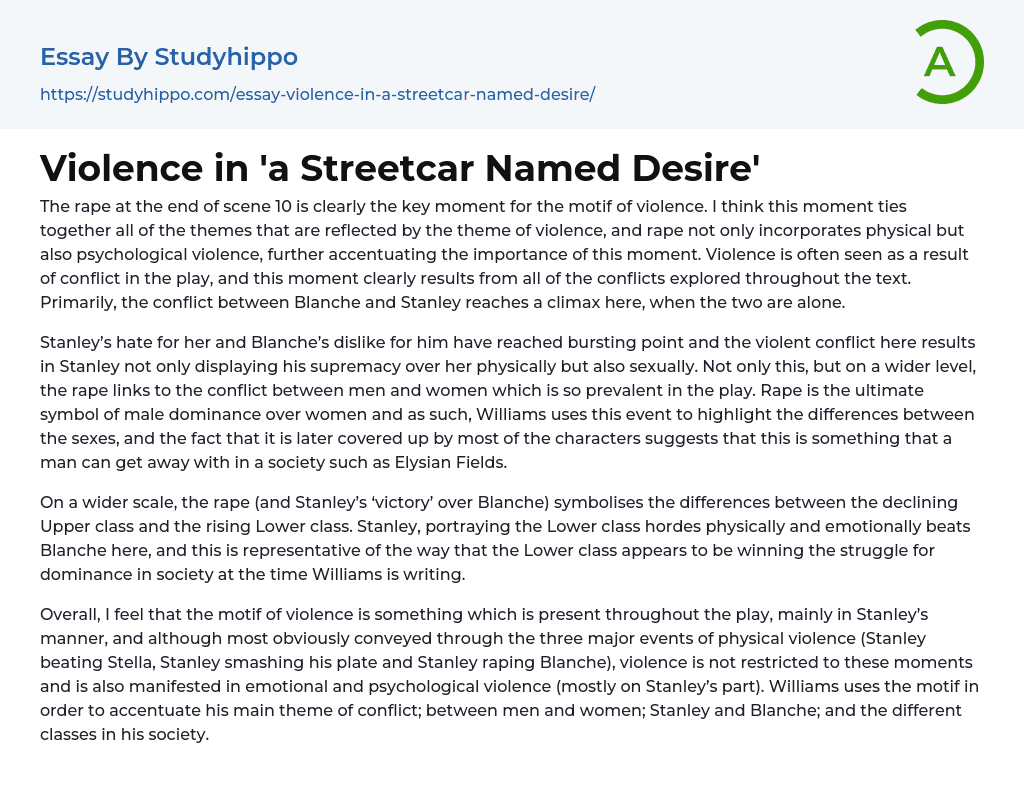The rape at the end of scene 10 is clearly the key moment for the motif of violence. I think this moment ties together all of the themes that are reflected by the theme of violence, and rape not only incorporates physical but also psychological violence, further accentuating the importance of this moment. Violence is often seen as a result of conflict in the play, and this moment clearly results from all of the conflicts explored throughout the text. Primarily, the conflict between Blanche and Stanley reaches a climax here, when the two are alone.
Stanley’s hate for her and Blanche’s dislike for him have reached bursting point and the violent conflict here results in Stanley not only displaying his supremacy over her physically but also sexually. Not only this, bu
...t on a wider level, the rape links to the conflict between men and women which is so prevalent in the play. Rape is the ultimate symbol of male dominance over women and as such, Williams uses this event to highlight the differences between the sexes, and the fact that it is later covered up by most of the characters suggests that this is something that a man can get away with in a society such as Elysian Fields.
On a wider scale, the rape (and Stanley’s ‘victory’ over Blanche) symbolises the differences between the declining Upper class and the rising Lower class. Stanley, portraying the Lower class hordes physically and emotionally beats Blanche here, and this is representative of the way that the Lower class appears to be winning the struggle for dominance in society at the time Williams is
writing.
Overall, I feel that the motif of violence is something which is present throughout the play, mainly in Stanley’s manner, and although most obviously conveyed through the three major events of physical violence (Stanley beating Stella, Stanley smashing his plate and Stanley raping Blanche), violence is not restricted to these moments and is also manifested in emotional and psychological violence (mostly on Stanley’s part). Williams uses the motif in order to accentuate his main theme of conflict; between men and women; Stanley and Blanche; and the different classes in his society.
- Media Violence essays
- Domestic Violence essays
- Violence in Video Games essays
- Gun Violence essays
- Video Game Violence essays
- Violence Against Women essays
- Youth Violence essays
- A Doll's House essays
- A Midsummer Night's Dream essays
- A raisin in the sun essays
- A Streetcar Named Desire essays
- An Inspector Calls essays
- Death of a salesman essays
- Everyman essays
- Fences essays
- Hamlet essays
- Hedda Gabler essays
- Iago essays
- King Lear essays
- Macbeth essays
- Much ado about nothing essays
- Oedipus Rex essays
- Oedipus The King essays
- Othello essays
- Pygmalion essays
- Romeo And Juliet essays
- Tartuffe essays
- The glass menagerie essays
- The Importance of Being Earnest essays
- The Merchant Of Venice essays
- The Taming of The Shrew essays
- Twelfth Night essays
- Waiting For Godot essays
- Ambition essays
- Anger essays
- Betrayal essays
- Boredom essays
- Confidence essays
- Courage essays
- Desire essays
- Disgrace essays
- Doubt essays
- Empathy essays
- Fairness essays
- Fear essays
- Feeling essays
- Forgiveness essays
- Grief essays
- Guilt essays
- Happiness essays




